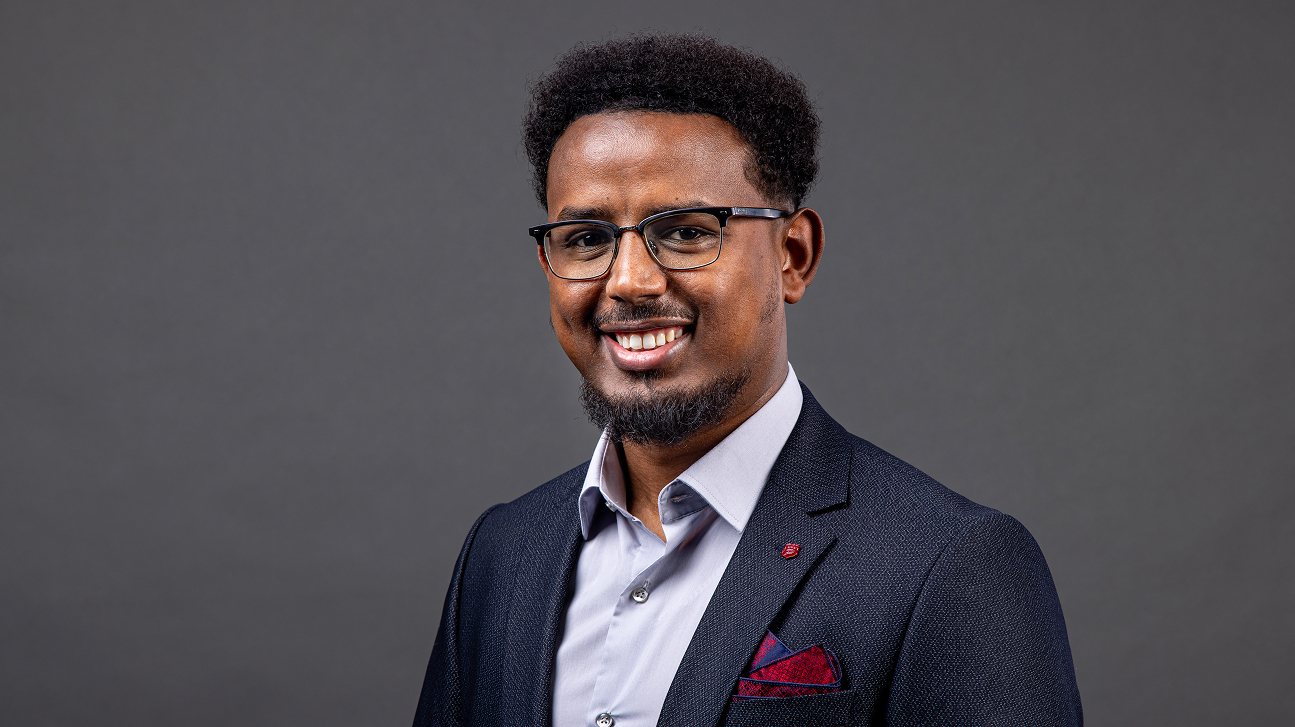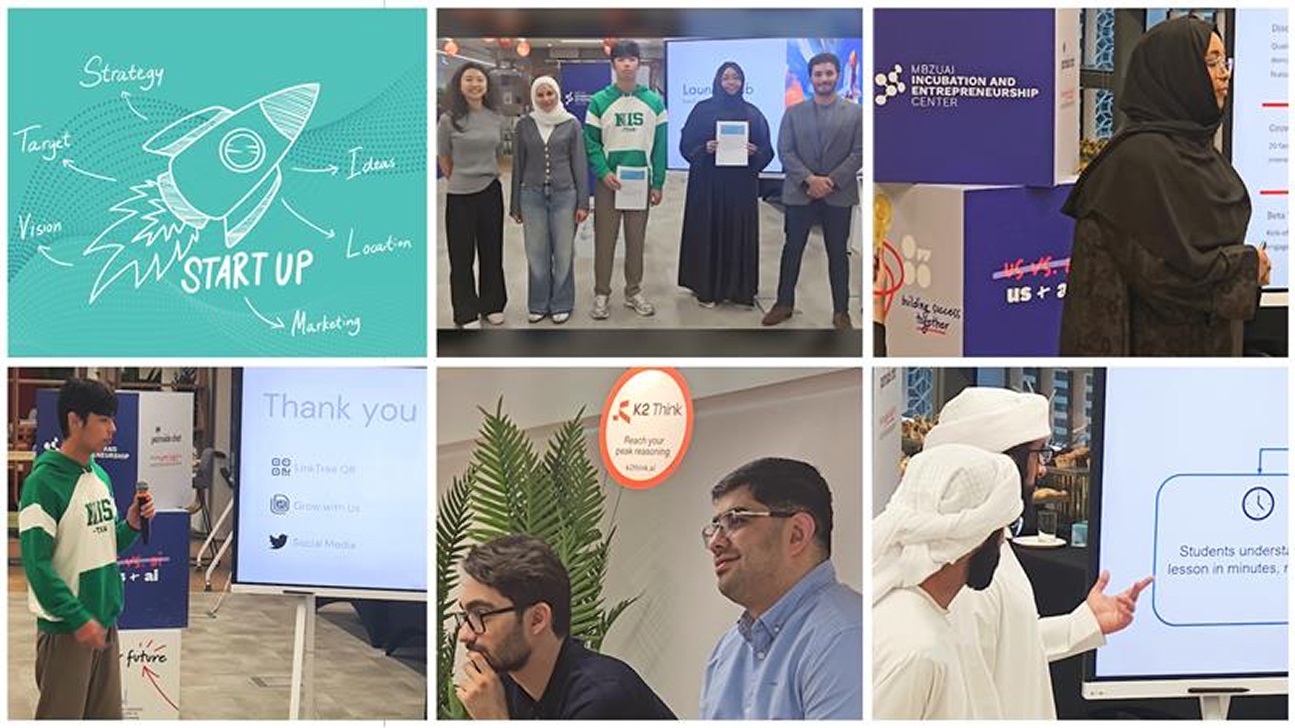MBZUAI graduate’s journey from Eritrea to empowerment
Friday, August 15, 2025

For many graduates of the Mohamed bin Zayed University of Artificial Intelligence (MBZUAI), a cap and gown mark the end of one chapter and the beginning of another in the world of cutting-edge innovation. But for Daniel Gebre, a proud member of the Class of 2025, this milestone is more than a personal achievement – it’s a bridge between two worlds.
Gebre, originally from Dekemhare, a city about 40-kilometres southeast of Eritrea’s capital Asmara in Africa, is part of the first cohort of Eritrean students to graduate from MBZUAI. His research into compressing large language models (LLMs) to run offline on mobile devices is more than an academic curiosity – it’s a personal mission rooted in lived experience and designed for impact in under-resourced regions including his homeland.
“Growing up in a place where internet access was scarce and often unreliable, I know all too well the frustration of being curious, ambitious, and eager to learn, yet constantly held back by limited digital resources,” Gebre says. “That experience left a lasting mark on me – not as a setback, but as a strong motivation.”
An opportunity that changed everything
Gebre’s journey to MBZUAI began when he was studying Computer Engineering at the College of Engineering at Mai-Nefhi in Eritrea. In 2019, he was selected for a prestigious Merit Scholarship awarded by the UAE Ministry of Education to the top 100 engineering students from his country. “I was lucky to be one of these 100 students, and that’s how I came to the UAE,” he says. “It changed everything.” It opened the door to continue his studies in the Emirates like hundreds of other Eritreans before him.
MBZUAI’s Class of 2025 has a total of three graduates from Eritrea, all of whom benefitted from the UAE Government’s generosity and pathway. Gebre enrolled at Zayed University, where he earned a bachelor’s degree in information technology with a focus on cybersecurity. His pivot towards studying artificial intelligence (AI) began when he worked as a research intern with Dr. Moayad Aloqaily and Professor Mohsen Guizani at MBZUAI. “They really solidified my interest. They were great mentors,” Gebre says.
Guizani encouraged him to stay and pursue his Master of Science in Machine Learning at MBZUAI. “Honestly, my plan was to go abroad, but in every meeting Professor Mohsen encouraged me to apply for my master’s here,” he said. “I was lucky to be accepted.”
Research with a mission: AI that works offline
At MBZUAI, Gebre developed iShrink, a compression pipeline that reduces the size of LLMs so they can run entirely offline on mobile phones and edge devices. His research was fueled by a key question: What if access to the internet wasn’t a requirement to access cutting-edge AI? That question became the heart of his master’s thesis.
“iShrink is about putting powerful AI in the hands of those who’ve historically been left out of the AI revolution,” he says. “It’s about enabling people to learn, innovate, and grow on their own terms, no matter where they are.”
For people in areas like rural Eritrea, where connectivity is intermittent or virtually non-existent, such technology could be transformational. “There were times when simply trying to download a document or watch an educational video felt like a privilege, not a given,” Gebre adds.
He recalls students sharing access to a single connection point at his former college, or relying on an offline version of Wikipedia downloaded as a file to study. iShrink, he believes, can take this kind of workaround to the next level – offering real-time, offline access to intelligent systems.
“Imagine students in remote villages being able to ask questions and get high-quality explanations from an AI tutor, or medical trainees using an offline assistant to study terminology and case summaries,” he says. “It’s not just technical efficiency – it’s empowerment.”
Early challenges, long hours, and growth
Gebre’s path through MBZUAI wasn’t without difficulty. He admits his first semester was an uphill climb. “I couldn’t pick up the pace,” he says. “There were months where I had to wake up at 9 a.m., study all day, attend classes, and then sleep at 3 a.m.”
To catch up, Gebre spent countless hours on online learning platforms like Coursera, honing his mathematical foundations and filling in the gaps. “You’ve really got to take hold of your own journey,” he says. “This experience changed me – a lot. Technically, theologically, and personally.”
Support from his peers and mentors at MBZUAI kept him going. “I was lucky – I was surrounded by good people,” he adds.
The hard work paid off. In addition to completing his thesis, Gebre published three papers – two conference papers and one journal article – most recently presenting at the IEEE International Conference on Human-Machine Systems (ICHMS) in Abu Dhabi earlier this year.
AI for Eritrea and beyond
Gebre’s aspirations extend far beyond his own career. His long-term vision is to democratize access to AI in countries like Eritrea, where digital infrastructure lags behind but intellectual curiosity abounds.
“In our country, internet access is limited. Even at college, you must go to a specific spot and share weak connectivity with everyone,” he says. “Talking to friends back home, many of them have never heard of ChatGPT or Gemini or any LLMs.”
That digital divide, what Gebre calls “doing it the hard way”, is exactly what he hopes to address through iShrink.
“The goal is access for all – democratizing AI,” he says. “People who are unable to access this technology, not only in Eritrea but in many other places, can benefit from it.”
Language is also a challenge. Eritrea is home to nine ethnic groups, each with their own official language, making the development of localized AI tools complex. “Our population is around six million, and while English is common in some areas, it’s not universal,” he explains. “Hopefully one day we’ll have the human capital to train models in our own languages.”
Still, his focus for now is to assist college students – those like him who are hungry for knowledge but disconnected from the world’s digital resources. “Eventually we’ll see how we can help the general population,” he says.
What’s next? Applying his skills in industry
After six years in academia, Gebre is keen to gain experience in industry before considering returning to research.
“I had the chance to do an internship as an AI engineer at Technology Innovation Institute (TII),” he says. “It was my first time fully exposed to how AI technology works in production-ready environments. I really enjoyed my time there.”
Seeing firsthand how AI is applied at scale gave Gebre a sense of the impact his work could have. “Eventually, I’d like to pursue a Ph.D. but not before I get a taste of how these technologies can be used in the real world.” He will get to see the impact he can have in his new role as an Applied Scientist at Inception, a G42 company, working in an Abu Dhabi-based team delivering domain-specific industry AI solutions.
A journey rooted in gratitude
Gebre’s academic path from a college in Mai-Nefhi to presenting research at international conferences has been one of rapid evolution. But he remains deeply aware of the opportunity that made it possible.
“I’m so grateful for the support of the UAE government,” he says. “They gave me a chance that changed my life.”
Gebre’s mother and sister were in attendance as he accepted his master’s. He stands as a symbol of what’s possible when talent meets opportunity, and when AI is developed not just for profit or prestige, but for people.
“I hope this project can serve as a small step toward closing the digital divide,” he concludes, “and helping others unlock their potential regardless of where they’re born or what resources they have.”
Related
MBZUAI's Launch Lab equips alumni and students with practical startup tools
The six-week pilot program brought alumni and students together to turn early startup ideas into tangible ventures.
- alumni relations ,
- launch lab ,
- entrepreneurship ,
- alumni ,
- startups ,
AI and the silver screen: how cinema has imagined intelligent machines
Movies have given audiences countless visions of how artificial intelligence might affect our lives. Here are some.....
- science fiction ,
- fiction ,
- art ,
- artificial intelligence ,
- AI ,
- cinema ,
Mind meld: agentic communication through thoughts instead of words
A NeurIPS 2025 study by MBZUAI shows that tapping into agents’ internal structures dramatically improves multi-agent decision-making.
- agents ,
- neurips ,
- machine learning ,


